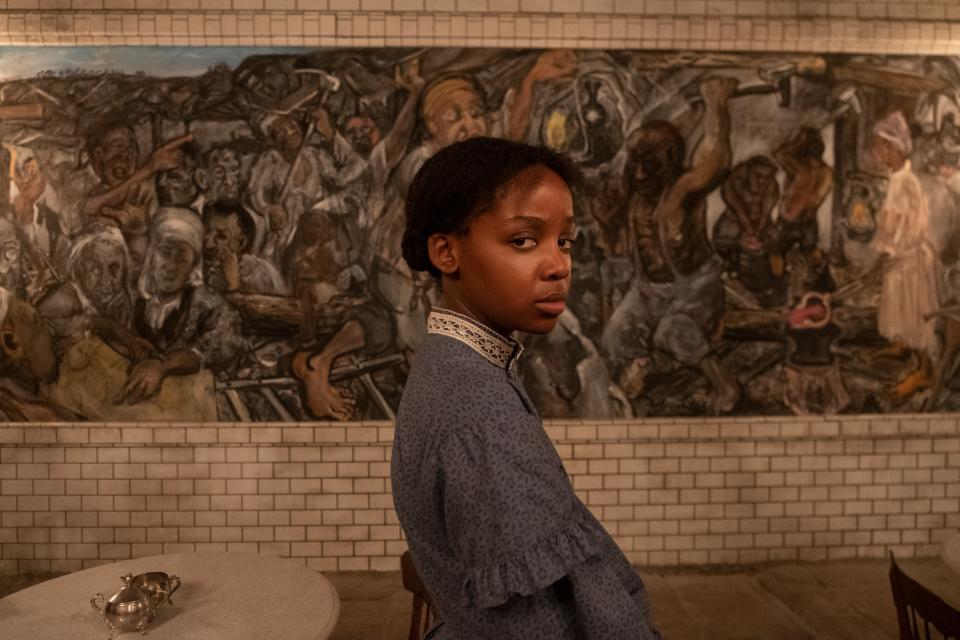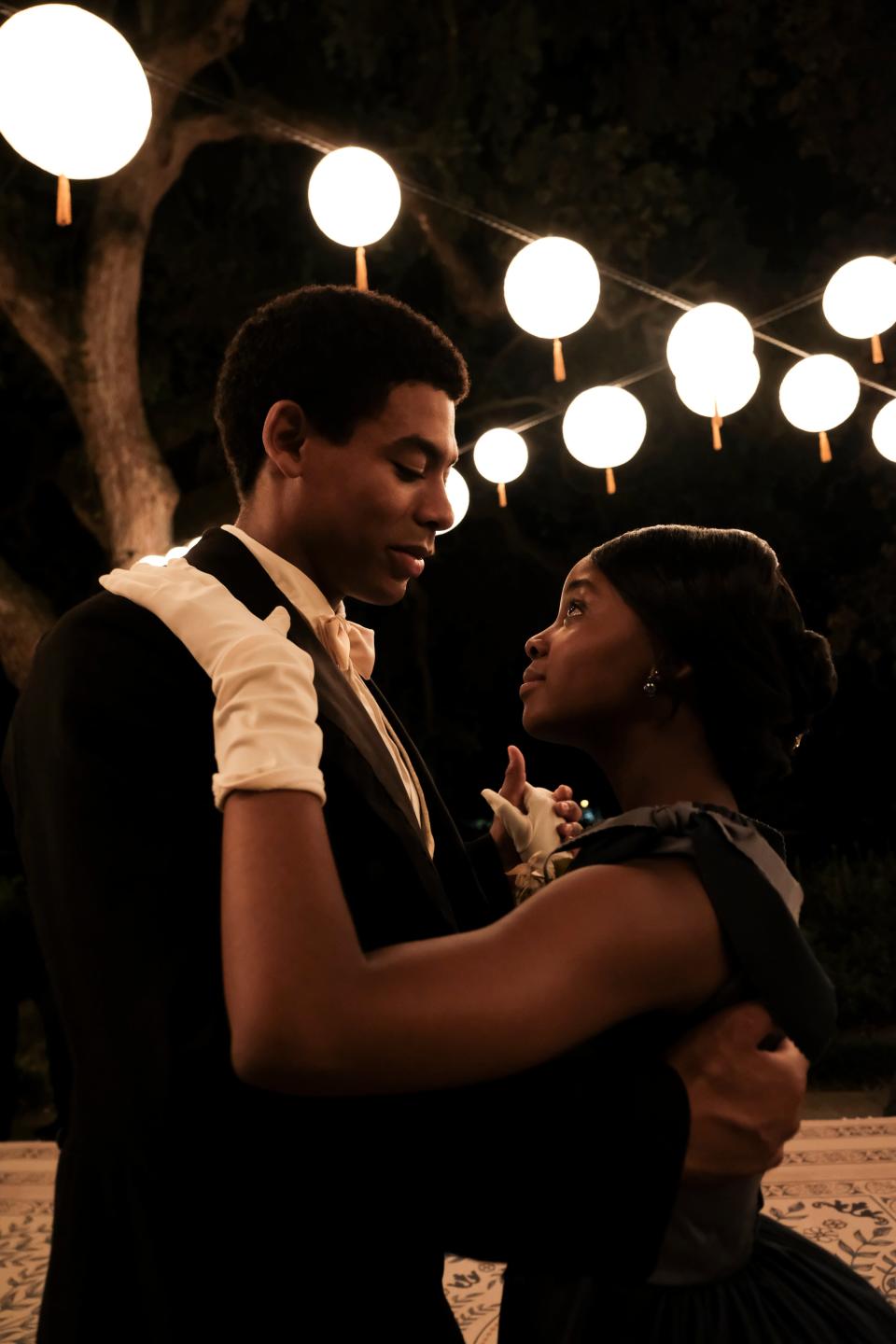The Underground Railroad review: Barry Jenkins’ American epic is a staggering achievement

In the second episode of The Underground Railroad, Oscar winner Barry Jenkins’ adaptation of Colson Whitehead’s novel, our protagonist Cora (Thuso Mbedu) has escaped from the living hell of a Georgia cotton plantation with her friend Caesar (Aaron Pierre).
They have travelled to the next state along, South Carolina, on a subterranean rail network run by abolitionists (a magical realist conceit that literalises the real-life whisper network of safe houses used to help enslaved people escape to the free states, or on to Canada), where they settle in an apparently progressive community. As they dance under the stars at one of the town’s benefit galas, it feels like a new beginning.
Something isn’t right, though, and perhaps one of the biggest warning signs is Cora’s new job at the museum, where she acts out scenes from her old life on the plantation, pretending to pick cotton from behind a glass barrier while the white visitors gawp, or dresses up as the embodiment of their vague ideas of what the tour guide refers to as “deepest, darkest Africa.” The museum owner reprimands Cora for failing to perform her pain in a way that will be sufficiently “authentic” for his ticket holders, before selling her role as empowering. “For us, by us!” he exclaims.
This uncanny set-up is partly so striking because it seems to echo Hollywood’s handling of slave narratives to date, turning trauma into spectacle and throwing in a white saviour figure for good measure. In The Underground Railroad, Jenkins does something different. There is horror, of course, especially in (though not confined to) the first ‘chapter’ of his 10-part series, where the plantation owners and their friends dance as a runaway is made an example of in gruesome fashion, but in this director’s hands, it doesn’t feel exploitative or gratuitous. It is part of the story, not the whole. Sometimes, stories of cruelty are spoken rather than shown, and the words alone are enough.

Cora, whose mother Mabel (Sheila Atim) escaped the plantation but left her 10-year-old daughter behind, travels on from that false utopia in South Carolina to its sister state, where the railroad station has been hurriedly bricked up: here, black people are outlawed, and the bodies of runaways and their helpers hang from trees on the ‘Freedom Trail.’ As she moves, she is stalked by the slave hunter Ridgeway (Joel Edgerton), who once failed to catch Mabel and is now consumed by the single-minded pursuit of her daughter.
As Cora travels from state to state, Jenkins brings Whitehead’s worlds to life in jaw-dropping detail. Each railroad station has its own distinct character, from the dark cavernous tunnels of Georgia to the subway tiles and round bar tables of Tennessee; almost every shot (captured by Jenkins’ long-standing collaborator James Laxton) has a painterly quality, complemented by a haunting score from Nicholas Britell (who was Oscar-nominated for his work on Moonlight and If Beale Street Could Talk). Even in the era of peak TV, it is still rare for a show to feel so cinematic, more like a cycle of short films than a streaming series.

In lesser hands, these flourishes might risk prettifying a painful chapter of history, but all this visual spectacle never overshadows the characters moving through it. Mbedu, who is already a major star in her home country of South Africa, gives a startling performance that requires her to plumb every emotional depth, while London-born actor Pierre (Jenkins spotted him and Atim when they appeared in the Globe’s production of Othello in 2018 alongside Moonlight’s André Holland) is unforgettable as the idealistic, fiercely intelligent Caesar.
One 40-minute chapter (most instalments have a run time of just over an hour, but the freedom of streaming has given Jenkins the scope to expand or compress his storytelling where he sees fit) provides vignettes of Ridgeway as a young man failing to impress his more liberal father (Peter Mullan): its purpose is not to redeem the slave catcher, but rather to elucidate the ideologies that have shaped his cruelty. Perhaps most puzzling of all is Homer, the young black child who acts as Ridgeway’s henchman, dressed like a tiny grown-up in a bowler hat and suit, an inscrutable expression playing on his face as he does his boss’s bidding. He is an enigma, and 11-year-old Chase W. Dillon, who plays him, wrings an indelible performance from his sparse dialogue.

Though all 10 episodes will arrive on Amazon at once, this is not a series to race through - it is too expansive, too packed with ideas and images to do so, and each instalment deserves to be given space. Over the course of this American epic, Jenkins proves he’s one of the most gifted, versatile and continually surprising filmmakers working right now. It’s a staggering achievement, and one that for many directors would be their defining work, but with Jenkins, this feels more like a statement of intent, and a sign of more to come.
The Underground Railroad is available to stream on Amazon Prime Video now
Read More
Aaron Pierre: When Barry Jenkins DM’d me, I thought it must be a joke
Leigh-Anne: Pop, Race & Power - a moving look at music industry racism
What to watch this week, from The Underground Railroad to Danny Boy

 Yahoo Finance
Yahoo Finance 